Do Vaccines Cause Autism?

Understanding the Scientific Perspective on Vaccines and Autism
The question of whether vaccines cause autism has persisted for decades, fueled by misinformation and mistaken interpretations of early studies. This article explores the extensive scientific research conducted over the years to clarify this issue, emphasizing the safety of vaccines and the true causes of autism spectrum disorder (ASD). We will examine the origins of the vaccine-autism myth, review key studies, and explain why the scientific consensus firmly dismisses any link between vaccines and autism.
The Origins and Discrediting of the Vaccine-Autism Hypothesis
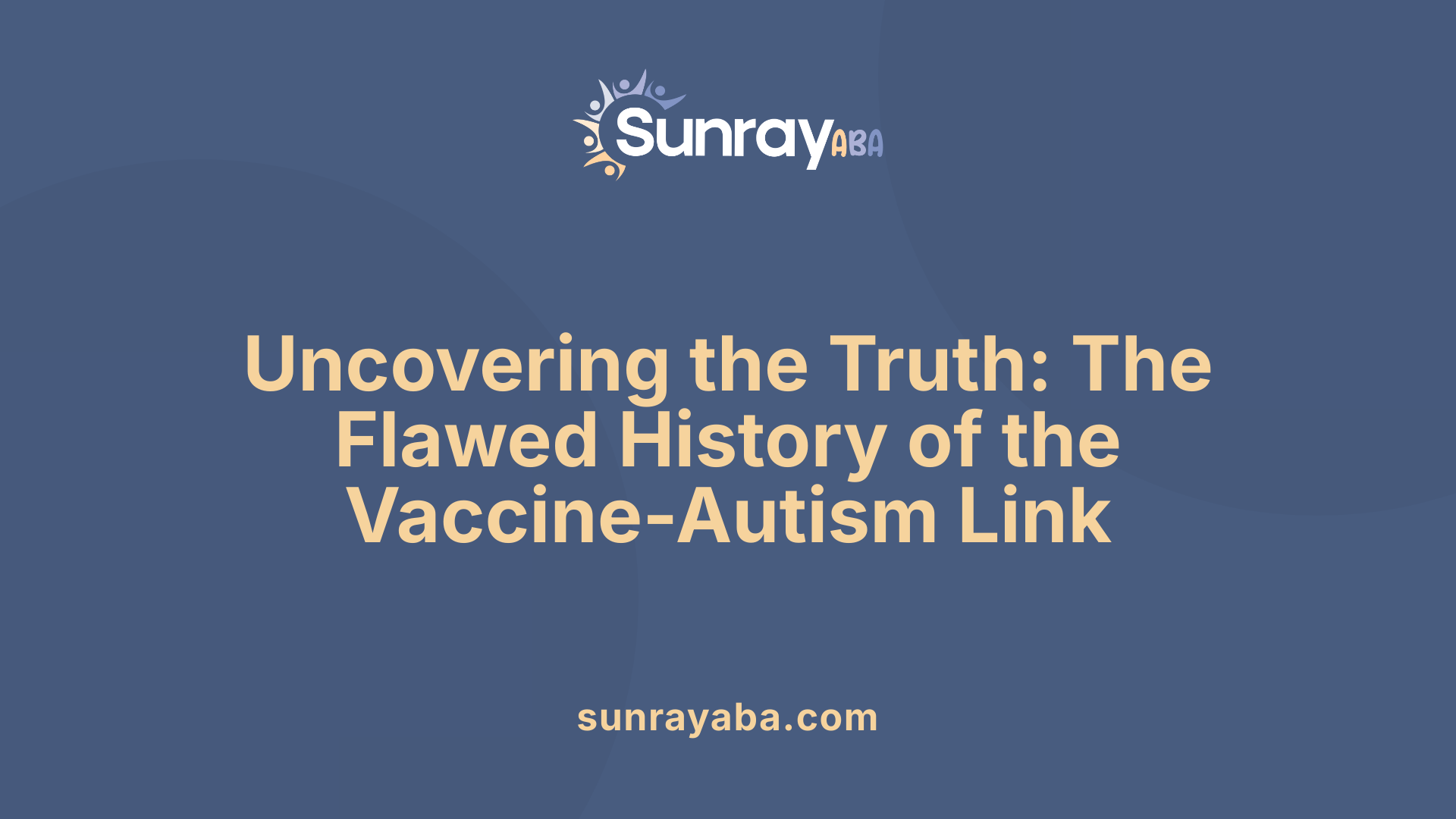
The 1998 Wakefield study and its flaws
In 1998, a British doctor named Andrew Wakefield published a paper suggesting a link between the MMR vaccine and autism. This study gained widespread attention despite its small sample size and methodological issues. It claimed to find evidence that the vaccine might cause autism in some children, sparking fears among parents worldwide.
However, subsequent investigations uncovered serious flaws in Wakefield's research. Many of the study's data were falsified, and conflicts of interest were revealed, including financial ties to lawyers involved in vaccine lawsuits. These ethical violations led to intense scrutiny and condemnation within the scientific community.
Retraction and ethical violations
Due to the misconduct, The Lancet, the journal that published Wakefield's study, retracted the paper in 2010. The General Medical Council in the UK also found Wakefield guilty of serious professional misconduct, leading to his medical license being revoked. This retraction was a crucial step in discrediting the original findings.
The scientific consensus firmly rests on this repudiation. Extensive research over the following decades has repeatedly shown no evidence supporting a causal link between vaccines and autism. Large epidemiological studies in countries such as the US, Denmark, Japan, and Canada involving hundreds of thousands of children have consistently found no association.
Impact on vaccination rates and public health
Despite the scientific refutation, the Wakefield controversy initially led to decreased vaccination rates in some regions, resulting in resurgence of preventable diseases like measles. This outbreak underscored how misinformation can undermine public health efforts.
Today, health authorities—including the CDC, WHO, and the American Academy of Pediatrics—affirm that vaccines are safe. They emphasize that the initial study was flawed, retracted, and that extensive scientific evidence confirms no link exists between vaccines and autism. Continued public education and transparent research help maintain high vaccination coverage, protecting communities worldwide.
Extensive Research Finds No Link Between Vaccines and Autism
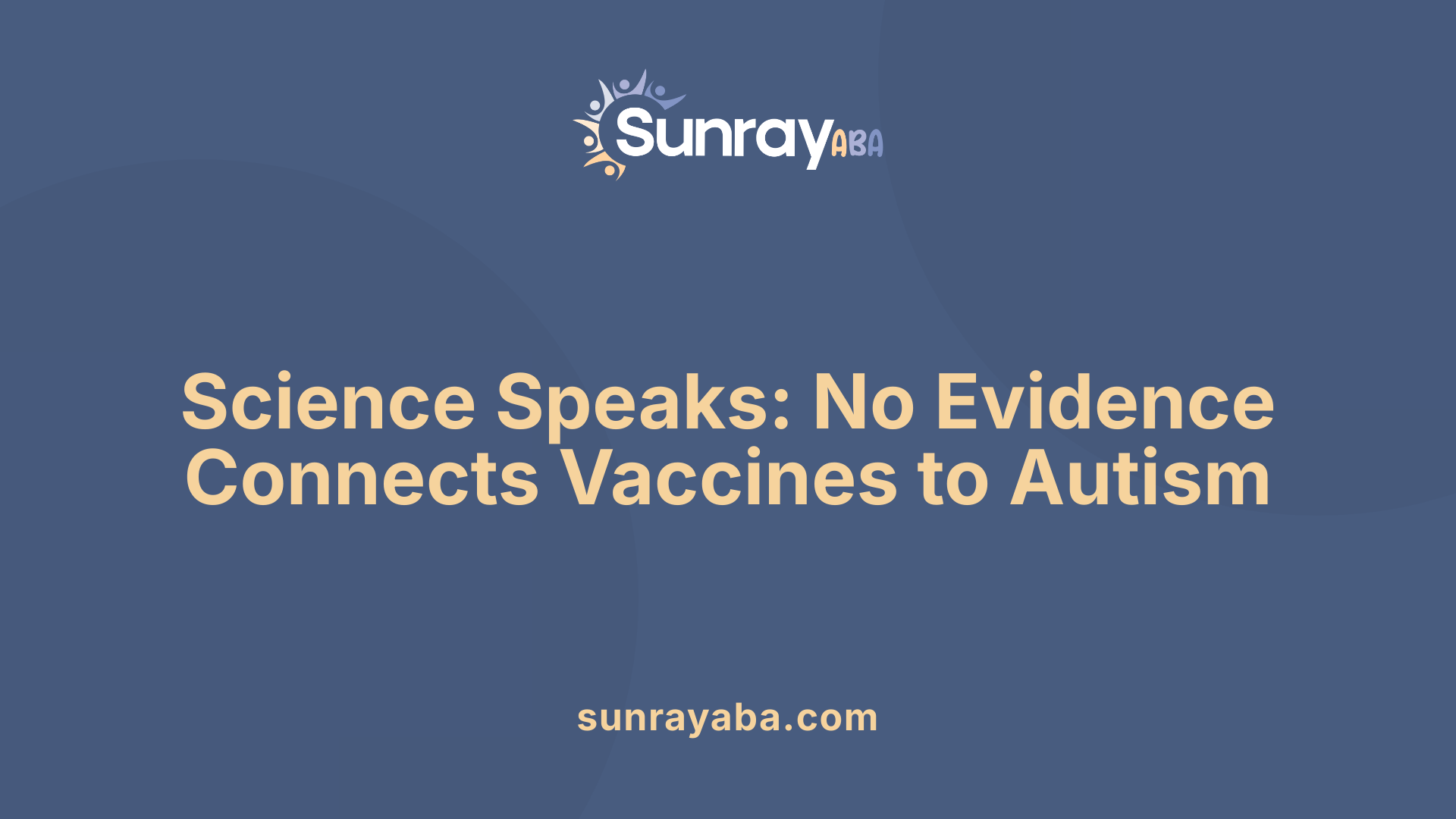
What do large epidemiological studies involving different countries tell us about vaccines and autism?
Multiple large-scale studies conducted across various countries have consistently found no association between vaccines and autism. For example, research analyzing data from over 95,000 children in the United States and more than 650,000 children in Denmark showed no increased autism risk linked to the MMR vaccine.
Other investigations in the UK, Japan, and Canada have reaffirmed these findings. These studies include examining vaccination schedules, age at vaccination, and autism diagnosis rates. The universally consistent results support the conclusion that vaccines do not cause autism, regardless of geographic location or vaccination protocols.
What have studies on vaccine ingredients like thimerosal shown?
Thimerosal, a mercury-based preservative used in some vaccines, has been extensively studied. Research found no credible link between thimerosal and autism. The removal of thimerosal from most childhood vaccines in the US starting in 2001 did not result in a decrease in autism rates, further undermining claims of causality.
Meta-analyses involving over 1.2 million children, as well as studies analyzing specific ingredients, demonstrate that none of the vaccine components, including thimerosal, are associated with autism spectrum disorder. These comprehensive evaluations provide strong scientific assurance that vaccine ingredients are safe.
What does research on vaccine timing and immune response suggest?
Studies exploring whether the timing of vaccines affects autism development have shown no causal relationship. Research indicates that autism symptoms are typically evident before children receive vaccines like MMR, suggesting vaccines do not trigger autism onset.
Large investigations into the number of vaccines administered at one time have also found no link to autism. Additionally, research on early immune responses, gastrointestinal issues, and family genetics confirms that autism is influenced by genetic and early neurodevelopmental factors, not vaccination timing.
Overall, multidisciplinary studies reinforce the understanding that vaccination schedules, immune impacts, and ingredients do not contribute to autism development.
| Topic | Findings | Additional Details |
|---|---|---|
| Large epidemiological studies | No link between vaccines and autism across multiple countries and large populations. | Studies involve hundreds of thousands to millions of children worldwide. |
| Vaccine ingredients (Thimerosal) | No evidence connecting thimerosal to autism, even after its removal from most vaccines. | Meta-analyses of over 1.2 million children confirm safety. |
| Vaccine timing and immune response | No evidence that the age of vaccination or the number of vaccines administered affect autism risk. | Autism symptoms usually appear before vaccination, indicating no causal connection. |
The accumulated scientific evidence underscores that vaccines are safe and that their components and timing are unrelated to autism. Ongoing research continues to support these conclusions, ensuring public health decisions are based on valid, rigorous data.
Understanding the Causes of Autism Spectrum Disorder
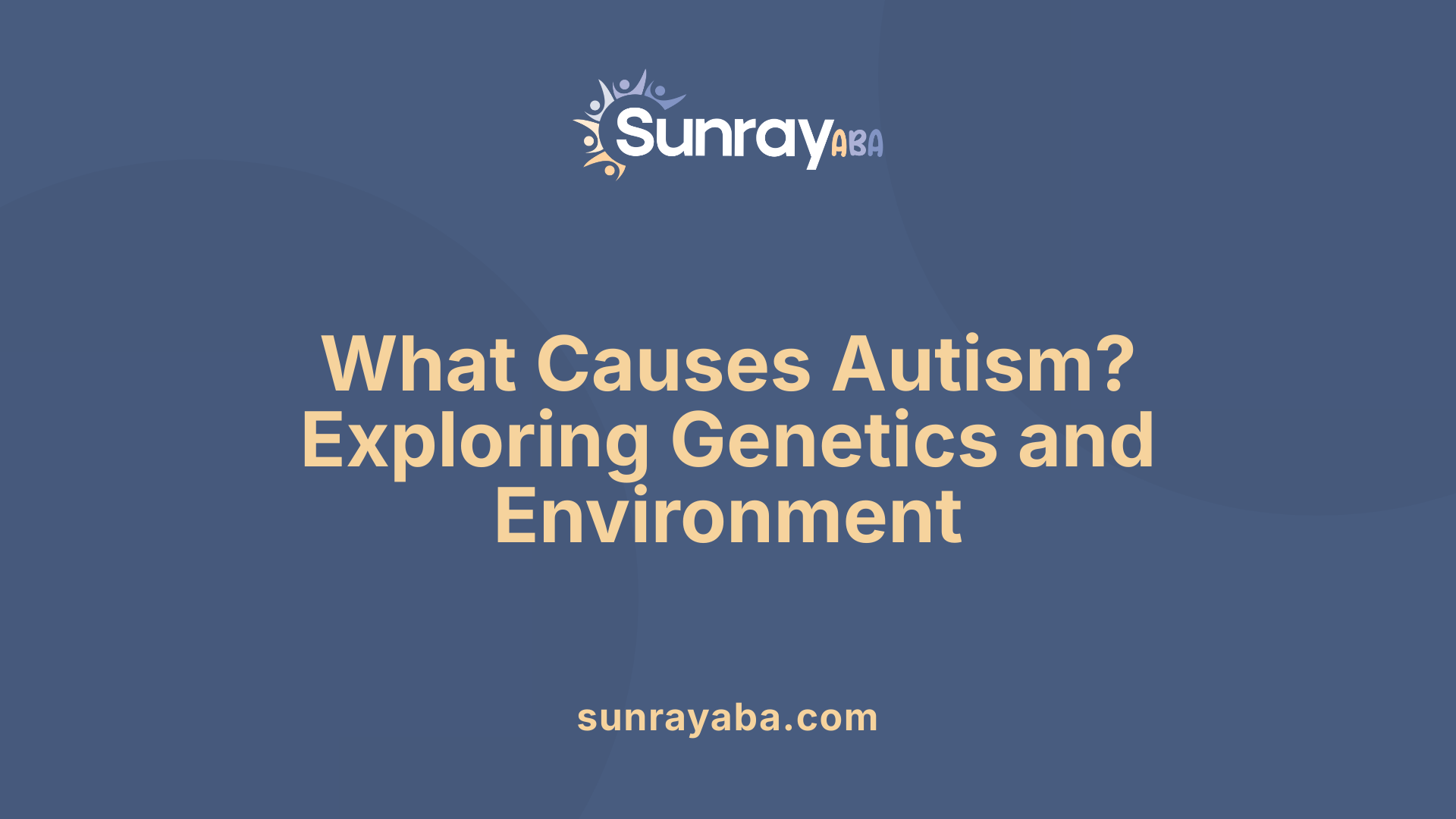
What are the actual causes of autism spectrum disorder?
Autism spectrum disorder (ASD) is a complex neurodevelopmental condition with multiple influences. Research over the past decades has shown that its development results from an interplay of genetic and environmental factors.
Genetic influences are a major component. Studies indicate that about 60-90% of the risk for ASD can be attributed to genetic factors. Autism tends to run in families, suggesting a strong hereditary component. Specific gene mutations and variations have been identified that increase susceptibility. Some genetic syndromes, like Fragile X or Rett syndrome, are known to be directly linked to autism, but most cases involve multiple gene changes affecting brain development.
Environmental influences also contribute to ASD risk. Factors such as advanced parental age at conception, prenatal exposure to air pollution, certain pesticides, and maternal health conditions during pregnancy—such as diabetes, immune disorders, or infections—have been associated with increased risk. Complications during birth, including oxygen deprivation, may also be related.
The interaction between genetic makeup and environmental exposures shapes early brain development. These influences can affect how neurons communicate, form networks, and develop during critical periods of neurodevelopment.
Importantly, extensive scientific research confirms that vaccines are not among the causes of autism. The initial hypothesis linking vaccines, particularly the MMR vaccine and thimerosal-containing vaccines, has been thoroughly discredited through large-scale, high-quality studies. These investigations consistently show no evidence that vaccines contribute to the development of ASD.
Understanding these factors helps clarify that autism is not caused by parenting styles, vaccinations, or other unfounded theories, but rather by a complex mix of genetic and environmental influences that affect early development.
The Flawed Foundation of the Vaccine-Autism Link and Why It Is Unsound
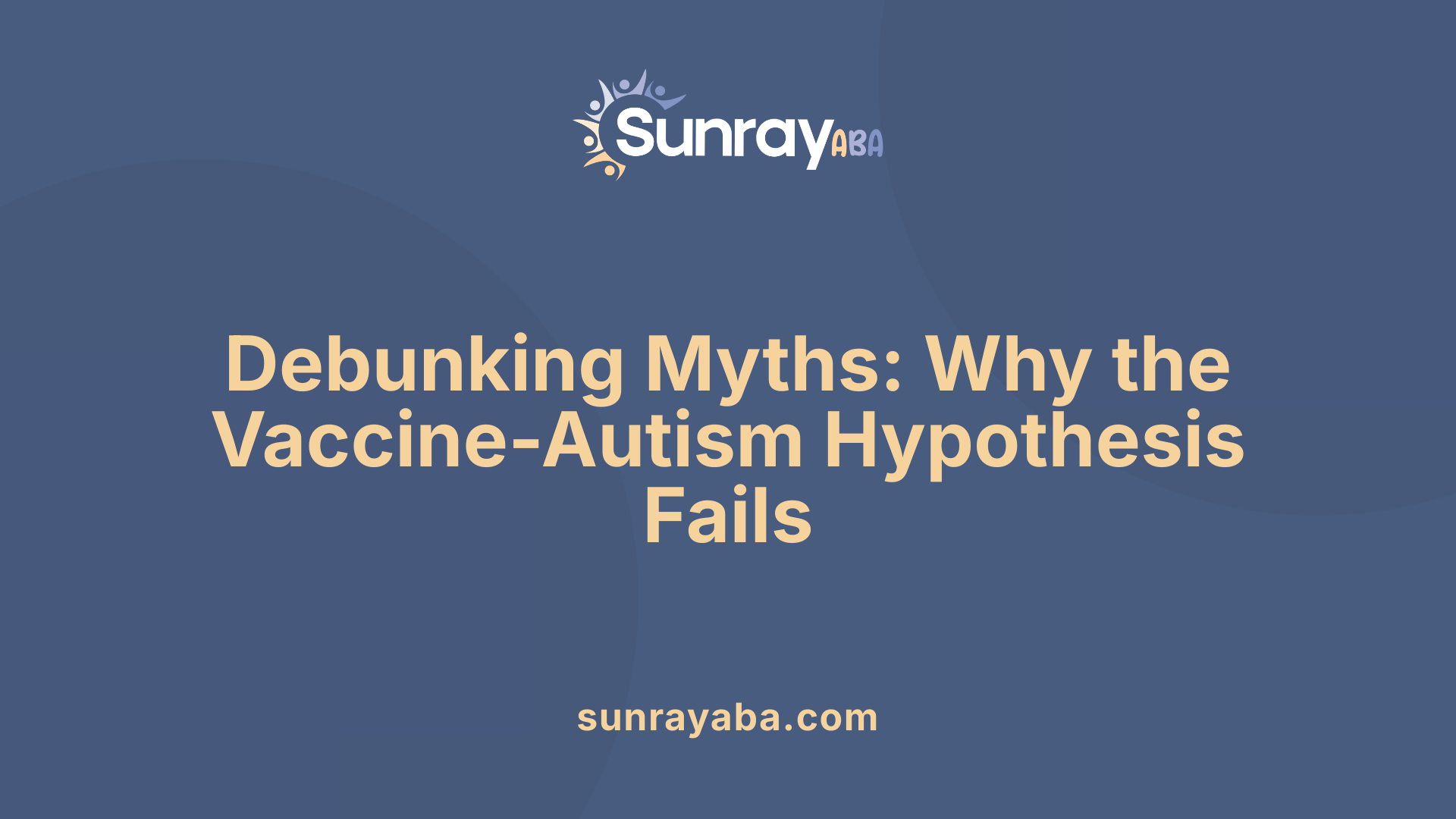
What is the history behind the claim that vaccines cause autism, and why is this claim unfounded?
The origin of the belief that vaccines might cause autism traces back to a 1998 study published by Andrew Wakefield in The Lancet. This study claimed to find a connection between the MMR (measles, mumps, and rubella) vaccine and autism. However, subsequent investigations revealed severe flaws, including data fabrication and ethical breaches.
Wakefield's research was discredited and ultimately retracted in 2010. The medical community found that Wakefield had manipulated data, and he had conflicts of interest that biased his findings. As a result, he lost his medical license, and the paper was officially withdrawn.
Despite the retraction, the publication caused widespread panic and fueled vaccine hesitancy. The media amplified these fears, often presenting the flawed study as credible, which misled many parents and caregivers.
Over the past two decades, extensive research from multiple countries has thoroughly examined the issue. Large epidemiological studies involving hundreds of thousands of children in places like the U.S., Denmark, the UK, Japan, and Canada have found no evidence linking vaccines to autism.
Further, scientific investigations show that autism symptoms typically appear before children receive vaccines like MMR. Most studies suggest autism is strongly influenced by genetic factors and early neurodevelopmental abnormalities.
The consensus among health authorities such as the CDC, WHO, and the Institute of Medicine is clear: vaccines do not cause autism. This conclusion is supported by biological research indicating no plausible mechanism for vaccines to trigger autism.
In summary, the initial claim was based on fraudulent research that has been thoroughly debunked. The current scientific evidence confirms that vaccines are safe, effective, and unrelated to autism, countering an unfounded myth that persists largely due to media influence and misinformation.
Dispelling Myths and Myths About Vaccines and Autism
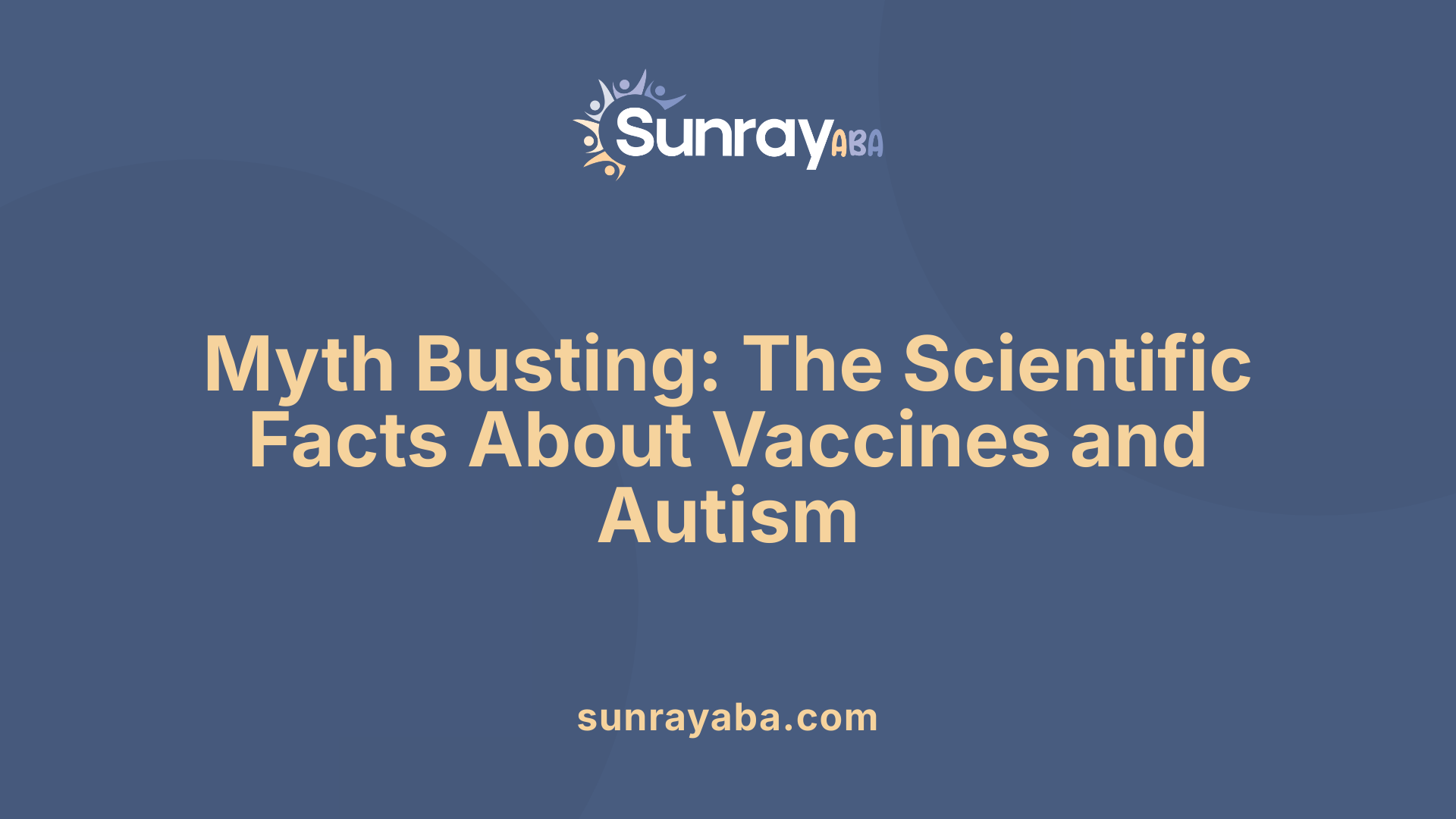
Are there common misconceptions linking vaccines to autism, and what does science say about these myths?
Many people encounter misconceptions that vaccines, especially the MMR vaccine, cause autism. These myths began with a controversial 1998 study by Andrew Wakefield, which claimed a link between the vaccine and autism. However, this study was later retracted because it was based on flawed methodology, ethical violations, and scientific misconduct.
Extensive research conducted over the last two decades has firmly disproven any connection. Large epidemiological studies involving hundreds of thousands of children in different countries, including the US, Denmark, Canada, and the UK, have found no evidence linking vaccines to autism spectrum disorder (ASD). Notably, studies examining the vaccine ingredients such as thimerosal, a mercury-based preservative used historically in some vaccines, also found no association with autism.
Scientific evidence indicates that autism symptoms typically appear before children receive vaccines like MMR, suggesting that vaccines are not triggers for autism onset. In addition, investigations into various vaccination schedules, delayed vaccinations, and early exposure have shown no increase in autism risk.
Public health organizations such as the CDC, the American Academy of Pediatrics, and the World Health Organization emphasize the safety and importance of vaccines. They highlight that vaccines contain safe, low-level ingredients and that the benefits of preventing serious diseases far outweigh any minimal risks.
In summary, myths linking vaccines to autism have been thoroughly debunked through rigorous scientific studies. Vaccines are a vital tool in public health, preventing deadly illnesses and protecting vulnerable populations through herd immunity. The overwhelming consensus is that vaccines do not cause autism, and promoting accurate, science-based information is crucial to maintaining public confidence and health.
Public Health and Vaccination Safety: Protecting Communities
Why do some parents choose not to vaccinate their children?
Many parents opt out of vaccinating their children primarily due to concerns about vaccine safety. These concerns often stem from fears of side effects or adverse reactions, fueled by misconceptions about vaccine ingredients. Mistrust in pharmaceutical companies, government agencies, and health authorities also contributes significantly to hesitation.
Cultural and religious beliefs can influence vaccination decisions, especially when there are fears related to substances like pork or worries about sterility. Some parents prefer to rely on natural immunity, believing that avoiding vaccines protects their children from potential harm.
Social media and media reports play a role by spreading misinformation, which intensifies fears and doubts. This misinformation can make it difficult for healthcare providers to communicate the facts regarding vaccine safety effectively.
Addressing these concerns requires clear, empathetic communication and community engagement. Building trust and providing reliable, evidence-based information are essential strategies to combat vaccine hesitancy and protect public health.
The importance of herd immunity
Herd immunity — the protection of entire communities when a critical portion of the population is vaccinated — is vital in preventing outbreaks of serious diseases like measles, mumps, and rubella. It safeguards those who cannot be vaccinated due to medical reasons or age, such as infants and immunocompromised individuals.
When vaccination rates drop, herd immunity weakens, allowing preventable diseases to spread more easily. This not only puts vulnerable populations at risk but also increases overall disease burden.
Maintaining high vaccination coverage is key to safeguarding everyone, especially those most at risk, and avoiding the resurgence of diseases thought to be controlled or eradicated.
Risks of vaccine refusal
Refusing vaccines increases the risk of disease outbreaks. Diseases like measles, which was declared eliminated in many countries, have re-emerged due to declining vaccination rates.
Vaccine refusal can lead to serious health complications, hospitalizations, and even death. It also strains healthcare systems and prolongs outbreaks, costing communities and governments significant resources.
Furthermore, vaccine hesitancy can foster a cycle of misinformation and fear, further reducing vaccination uptake and endangering public health.
How to address vaccine hesitancy
Combating vaccine hesitancy involves education, community outreach, and transparency. Healthcare providers should engage with hesitant families, listening to their concerns and providing factual information about vaccine safety and effectiveness.
Public health campaigns should focus on the benefits of vaccination, emphasizing the collective protection it offers and the risks of not vaccinating.
Building trust requires consistent, honest communication and addressing specific fears or misconceptions. Collaboration with community leaders, faith groups, and influential figures can help in spreading positive messages.
In the end, fostering a well-informed community committed to vaccination is essential to maintaining high coverage and protecting public health.
| Aspect | Explanation | Additional Details |
|---|---|---|
| Vaccine hesitancy reasons | Safety fears, mistrust, cultural beliefs, misinformation | Cyber misinformation, media influence |
| Risks of refusal | Outbreaks, disease resurgence, health complications | Strain healthcare resources |
| Approaches to address | Education, transparency, community engagement | Involving community leaders |
Staying informed about the facts surrounding vaccines helps reinforce their safety. Multiple rigorous scientific studies confirm that vaccines do not cause autism or other serious health issues, and that their benefits far outweigh the minimal risks. By understanding and addressing the reasons behind vaccine hesitancy, communities can work together to protect everyone from preventable diseases.
The Firm Scientific Consensus and Path Forward
Decades of thorough scientific research, rigorous monitoring, and reviews by health experts worldwide have confirmed that vaccines are safe and do not cause autism. The myth linking vaccines to autism originated from a flawed study and numerous conspiracy theories, which have been thoroughly debunked. Protecting public health requires trusting in the scientific process, supporting vaccination programs, and combating misinformation. Vaccines remain one of the most effective tools for preventing deadly diseases and safeguarding communities. Understanding the true causes of autism and supporting ongoing research into genetic and environmental factors will continue to improve outcomes for children with ASD. The scientific community urges the public to rely on credible evidence and to participate in vaccination programs for a healthier future.
References
- The Evidence on Vaccines and Autism | Johns Hopkins
- Autism and Vaccines - CDC
- Do vaccines cause autism? - Autism Speaks
- Here is how we know that vaccines do not cause autism - STAT News
- Vaccines and Autism | Children's Hospital of Philadelphia
- Vaccination as a cause of autism—myths and controversies - PMC
- Frequently Asked Questions about Autism Spectrum Disorder - CDC
- Is There a Connection Between Vaccines and Autism? - Kids Health
- Fact Checked: Vaccines: Safe and Effective, No Link to Autism - AAP
- Autism and Vaccines - Autism Science Foundation